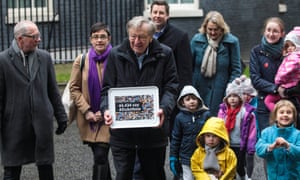"Sea Watching."
Grey waters, vast
as an area of prayer
that one enters. Daily
over a period of years
I have let my eye rest on them.
Was I waiting for something?
Nothing
but that continuous waving
that is without meaning
occurred.
Ah, but a rare bird is
rare. It is when one is not looking
at times one is not there
that it comes.
You must wear your eyes out
as others their knees.
I became the hermit
of the rocks, habited with the wind
and the mist. There were days,
so beautiful the emptiness
it might have filled,
its absence
was as its presence; not to be told
any more, so single my mind
after its long fast,
my watching from praying.
– R.S. Thomas
in Laboratories of the Spirit, 1975
The sea is a rich symbol for what goes on inside us. Restless or calm, stormy or quiet, surging with energy, swirling in powerful currents, revealing hidden depths and glittering or dull surfaces, rhythmic sounds of waves, lapping or crashing on the beach; an endless fascination of possibilities. R S Thomas spent hours, days, sometimes weeks sea watching. One of his finest poems plunges into a theology of prayer that is spare, interrogative, hopeful, but in the end realistic about what it might feel like to search for God and not find, to listen for God and not hear, to suspect that it is not God's absence that is the problem but, perhaps, our not being present, not being there, when God is.
'Sea Watching' is written in a form suggestive of the ebb and flow of the tide, the gathering of movement in each waye as it approaches, breaks on the shore and recedes. The syntax is crafted to allow long spaces between words and lines, the silences of white and the voices of the words, in rhythmic alternating cadence. As a meditation on the sea, and on the human search for the God who searches for those so busy looking for him they miss him, it is a moving and honest recognition of how hard it is to discern the presence of God. "…..Daily / over a period of years / I have let my eyes rest on them." The urge and urgency of regular waiting, watching, hoping for a glimpse or an intimation of God's presence that can be confirmed, clung to as proof and evidence. But of what?
That first line,"Grey waters, vast…" suggests both immensity and mystery, a reality that is impenetrable and incomprehensible, yet there. Unlike a number of Psalms, Thomas doesn't invoke the sea as source of chaos and danger, overwhelming and inundating those who are near it. It is the hidden depths that interest him, the perduring, persistent presence of the seascape, always changing but always the recurring rhythms, energy and movement towards the shore. Prayer has an area as vast and mysterious as the sea; stated like that it is a truism as flat as a docile sea. But Thomas takes a familiar metaphor and pours into it the passionate longing and intense watching and waiting that is the inner world of devotion, and in particular his own search for an authentic spirituality dismissive of all comfortable familiarity and warm feelings verging on the sentimental. This is a poem about the "Grey waters, vast…", the untamed potency of the sea, mysterious and unfathomable, cold if also filled with life. It is an acoount of a man who has come to accept that "You must wear your eyes out / as others their knees."
There are echoes of the Gospel of John, with its various verbs for seeing, beholding, looking, gazing and glimpsing. Each mode of visual perception and inner processing of what is seen, come together and make up the watchful attentiveness and alert constancy of concentration, and encourage the disciplined return, daily for years, and still with no certainty of a sighting, a discovery of the One being sought.
Those of us who walk by the sea find in this poem personal resonances of what Thomas describes. And at times, that same sense that watching the sea and wanting to pray, merge into a recognition that to seek God, to watch for even a glimpse of the 'rare bird', and to do so daily, repeatedly, in all weathers, is to have learned to pray the prayer of longing, loving and answering the lure of the divine love.

